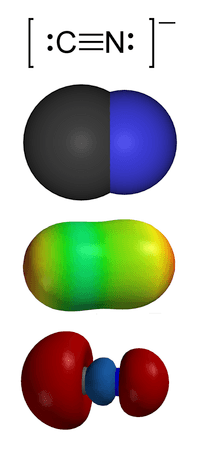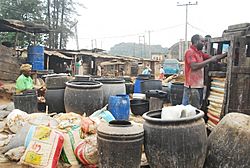Cyanide facts for kids
Cyanides are special chemicals that contain a group of atoms called the 'cyano-group'. This group has one carbon atom and one nitrogen atom joined together very strongly. You can find this group in many different substances. Some of these substances are very dangerous because they can release a tiny amount of cyanide that can be harmful.
Contents
What are Cyanides?
Cyanides are chemicals that have a special part called the 'cyano-group'. This group is made of a carbon atom and a nitrogen atom connected by three strong chemical bonds. Chemicals that contain this group are found in many places. Some of them can be very harmful if they release the cyanide compound.
Where are Cyanides Found?
Some tiny living things, like certain bacteria, fungi, and algae, can naturally make cyanides. You can also find cyanides in some foods and plants. For example, the plant cassava contains cyanides. These cyanides act like a natural defense for the plants. They help protect the plants from being eaten by animals that feed on them.
Are All Cyanides Dangerous?
In movies and stories, cyanides are often shown as extremely toxic. While some cyanides are indeed very dangerous, not all of them are. For instance, a cyanide compound called Prussian blue is actually used as a medicine. It helps treat people who have been poisoned by other substances, like thallium or caesium.
The most dangerous cyanides are usually hydrogen cyanide (HCN) and chemicals that are very similar to it. These include potassium cyanide (KCN) and sodium cyanide (NaCN). These chemicals are all related to hydrogen cyanide. Hydrogen cyanide itself is a gas, and it is very dangerous because it can cause harm if breathed in.
What is the Antidote?
If someone is exposed to cyanide, there is a special medicine that can help. This medicine is called Hydroxocobalamin. It works by reacting with the cyanide in the body to form a new substance called cyanocobalamin. This new substance is safe and can be easily removed from the body by the kidneys. This important antidote is sold under the name Cyanokit. It was approved for use in the U.S. in 2006.
See also
 In Spanish: Cianuro para niños
In Spanish: Cianuro para niños
 | Audre Lorde |
 | John Berry Meachum |
 | Ferdinand Lee Barnett |



